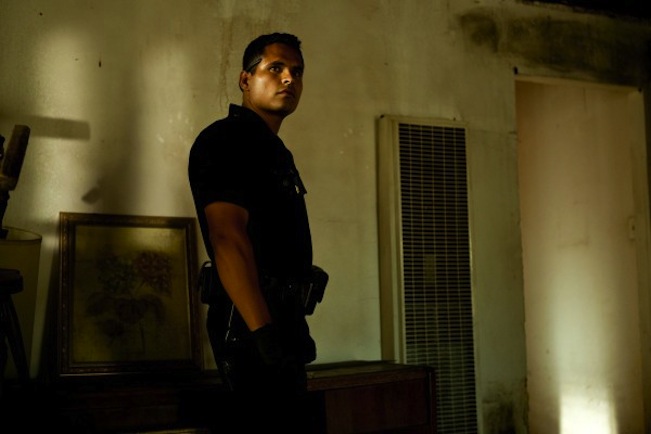By Jake Howell jake.howell@utoronto.ca
The Torontonian Reviews: End of Watch
 End of Watch is David Ayer’s third picture featuring the Los Angeles Police Department, making it clear the director isn’t yet bored with their legendary law enforcement. So what do you do when you’ve already written a roster of LAPD scripts and directed a pair of LAPD movies?
End of Watch is David Ayer’s third picture featuring the Los Angeles Police Department, making it clear the director isn’t yet bored with their legendary law enforcement. So what do you do when you’ve already written a roster of LAPD scripts and directed a pair of LAPD movies?
Ayer’s solution: you make a found-footage film. Looking for new ways to show the madness of the Los Angeles underworld, the director gives cameras to Jake Gyllenhaal’s Officer Taylor and Michael Peña’s Officer Zavala (“Z”), hoping the Blair Witch gambit will breathe new life into Ayer’s favourite topic.
The dice roll paid off, as it turns out. I suppose my only beef with this format of filmmaking is the “problem” of the genre—screenwriters have yet to really figure out a way to give characters a rational reason to film everything, usually causing the film to collapse under its own flawed logic. End of Watch deals with this issue by claiming the footage is for school credit, a ridiculous excuse that is thankfully discarded by the second act.
Either way, the cameras-everywhere set-up is basically meaningless. End of Watch is a cop movie, and as the narrative unfolds we don’t really care how or why the drama is being recorded–we’re just happy it is. For this reason, it’s frustrating to see Ayer try too hard to justify the style, because the found-footage house of cards crumbles when the film becomes aware of itself. When someone tells Taylor to turn his camera off, it reminds us of the fourth wall and ruins the immersion. It’s a fairly stupid device to begin with, so future entries in the genre should cease the attempts to over-explain the mode. Just go with it, guys, or not at all.
NBC comedy The Office works much the same way as End of Watch does, as both are filmed “diegetically” and “non-diegetically”–two fancy film terms to mean “in the universe” and “not in the universe.” There are shots captured by those who exist in the reality being depicted (the documentary crew in The Office, the dashboard cameras in End of Watch), but there are also shots recorded by the invisible, omniscient viewer. It’s a jarring blend at first, as audiences may wonder who is filming certain angles, but when the differences become obvious the film is seamless in its construction.
End of Watch goes above expectations with its depth. At its core, the film regards partnership and teamwork as its prevailing message, but there are other elements to its thematic qualities that are surprisingly moving. At a certain point early in the second act, End of Watch proposes it will be something more than your standard police flick, and it’s neat to see Ayer keep his promise. The crime narrative here is much larger than the typical homicide or drug deal. This is big theatre on a small stage, and the drama is palpable.
Ayer has a few tricks up his sleeve to keep the action tense, like lapel-cameras to show the world as a first-person shooter video game. These new perspectives do wonders for the genre, as other cop dramas fail to feel as dangerous and razor-sharp as End of Watch does. Each day on the job is volatile and life-threatening, as Taylor and Z encounter horrible crimes perpetrated by intimidating gangsters. The handheld cameras also serve to create intense claustrophobia, as every house visited is cramped and filled with places to hide. End of Watch’s handheld approach provides us a front-row seat to the risky business, and every turn around the corner we’re reminded how fragile the human body is.
It’s a good thing the chemistry between Peña and Gyllenhaal is excellent, as the two are side-by-side on screen for the film’s entire duration. When the stakes are low, Taylor and Z crack jokes (mostly racial) and recount chestnuts (mostly graphic) with each other. But when lives are on the line, the pair command attention with their laissez-faire police tactics and level-headed cool. On the road, between these ups and downs, the two also wax poetic about life: working with the LAPD, their relationships at home, and the prospects of the future. These police cruiser conversations are engaging and thoughtful; at times bordering on profundity.
Despite the initial silliness at the top of the film, End of Watch becomes so engrossing that we roll with its gimmicks, giving in to the sheer adrenaline and shaky-cam octane. The whole “found footage” thing is getting old n’ busted, but End of Watch shows some promise as the new hotness: Ayer has combined traditional filmmaking with handheld footage to create a truly riveting cop drama, going further and deeper than most ever do.
















“NBC comedy The Office works much the same way as End of Watch does, as both are filmed ‘diegetically’ and ‘non-diegetically’–two fancy film terms to mean ‘in the universe’ and ‘not in the universe.'”
End of Watch is a found footage film; The Office is a mockumentary. You’d think someone who knew “fancy film terms” would know the difference.
Except many episodes of The Office include scenes where it’s clear there is no in-world camera recording it.
Thus: diegetic and non-diegetic.